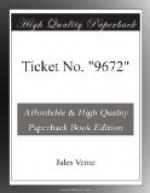“To witness the drawing? Certainly I do, my dear girl.”
“But it will be a very painful ordeal for me.”
“I admit it, but Ole wished you to be present at the drawing, Hulda, and Ole’s wishes must be obeyed.”
This phrase was certainly becoming a sort of refrain in Sylvius Hogg’s mouth.
CHAPTER XIX.
What a crowd filled the large hall of the University of Christiana in which the drawing of the great lottery was to take place—a crowd that overflowed into the very court-yards, as even the immense building was not large enough to accommodate such a throng, and even into the adjoining streets, as the court-yards, too, proved inadequate toward the last.
On that Sunday, the 15th of July, it certainly was not by their calmness and phlegm that one would have recognized these madly excited people as Norwegians. Was this unwonted excitement due solely to the interest excited by this drawing, or was it due, at least, in a measure, to the unusually high temperature of the summer’s day?
The drawing was to begin at three o’clock precisely. There were one hundred prizes—divided into three classes: 1st, ninety prizes ranging in value from one hundred to one thousand marks, and amounting in all to forty-five thousand marks; 2d, nine prizes of from one thousand to nine thousand marks, and amounting to forty-five thousand marks, and 3d, one prize of one hundred thousand marks.
Contrary to the rule that is generally observed in lotteries of this kind, the drawing of the grand prize was reserved for the last. It was not to the holder of the first ticket drawn that the grand prize would be given, but to the last, that is to say, the one hundredth. Hence, there would result a series of emotions and heart-throbbings of constantly increasing violence, for it had been decided that no ticket should be entitled to two prizes, but that having gained one prize, the drawing should be considered null and void if the same number were taken from the urns a second time.
All this was known to the public, and there was nothing for people to do but await the appointed hour; but to while away the tedious interval of waiting they all talked, and, chiefly, of the pathetic situation of Hulda Hansen. Unquestionably, if she had still been the possessor of Ole Kamp’s ticket each individual present would have wished her the next best luck to himself.
Several persons having seen the dispatch published in the “Morgen-Blad,” spoke of it to their neighbors, and the entire crowd soon became aware that the search of the “Telegraph” had proved futile. This being the case all felt that there was no longer any hope of finding even a vestige of the lost “Viking.” Not one of the crew could have survived the shipwreck, and Hulda would never see her lover again.




